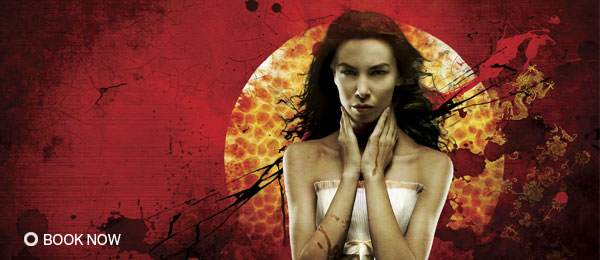|
Puccini gives us the other half of his Orientalist pairing in the opera Turandot, first performed in 1926. Having sweetened up audiences with Madama Butterfly's selfless lotus blossom character, he shocks the bourgeoisie with a tale of a wicked serial-killer Princess who kills her innocent male suitors when they fail to answer her three riddles.
The latest ENO production has decided not to subvert depictions of the Chinese as barbarian torture-mongers, but instead reinforces it with images of cannibalism which I suspect are absent from the original libretto roasted decapitated bodies of Turandot's victims hanging from the kitchen ceiling like barbecued duck, and stared at by a row of heads. Very appetising if you're planning an after-show dinner round the corner in Chinatown.
Perhaps they took their (barbe)cue from More Light at the Arcola this summer, where another yellowface production made much of Chinese cruelty. High art seems to be going all out to link China's most popular benign contribution to world culture, its food, with old colonialist fantasies of the Chinese as subhuman.
The visuals are effective if predictable; blacks and reds contrasted with Turandot's arctic white. The first half takes place in a decadent Chinese restaurant where a Peter Blakean cavalcade of western social types and slebs includes Chelsea Pensioners, three Elvises, an Uma Thurman Kill Bill Bride, hippies, clowns, Mexican wrestlers, golfers and Marilyn Manson are whipped into order by a quartet of black sequinned vamps. I particularly liked the cute identical fembots who looked like Blade Runner refugees in their Priss make-up and see-through mini-macs.
Princess Turandot (Kirsten Blanck) has been made cruel by the humiliation of a past princess by triumphalist foreign conquest (read decadent feminised old China). She's also the creation of a set of writers who, as with Conrad's Heart Of Darkness and Ryder Haggard's She, see the ultimate horror, the most fearful element of a fearful society, as being the female of colour: the spider at the centre of the web.
Apart from what this says about Western male paranoia about broads abroad, it's a denial of their own cruelty. Any guilt concerning the imposition of opium and the degradation of an entire nation finds no outlet here (see my last post). As long as the foreigner can be smarter and bring the decadent bee-atch to heel through sexual union, it'll be OK. In the ultimate humiliation, not only must she eat it, she must like it as well.
ENO attempts a bloodily Tarantinoesque solution to the problem that this is an unfinished work. The Writer (Scott Handy) has been an unseen presence throughout, visible only to us. He pushes the story forward through actions such as sounding the gong that summons the dreadful Turandot and choosing the decrepit old hippy to play her father, the Emperor (Stuart Kale).
He is inadvertently killed in the kitchen by Turandot's sword when the hero (Gwyn Hugh Jones as Calaf)) has answered the riddle but must make the Princess fall in love with him before daybreak. This is the point where Puccini stalled. The Writer writhes in agony for the duration like Tim Roth in Reservoir Dogs, presumably having to listen to the dog's dinner being made of his story. It might have been the suicide of his maidservant lover that made Puccini abandon the opera, or just the realisation that there is no elegant way to make the Big Thaw believable.
She has, after all, just had Liu (Amanda Echalaz), his adoring slave-girl, tortured to death in front of him in order to discover his true identity.
The opera's most famous aria, Nessun Dorma is, of course, lovely but surprisingly short. Such a shame it's been purloined by Football. Some of the opera's (English) lines had to be crowbarred in to fit the metre, and melodies from Madama Butterfly kept leaking through but it is a very pleasant listen. I was surprised to hear the unmistakeable strains of The East Is Red and I'm curious to know if Puccini was referencing a tune, already in existence, that would become China's national anthem.
The singing was fab. Liu's touching solos received a well-earned round of applause, and the two principals had a good set of lungs. Special mention to Ping, Pang and Pong, played as demonic chefs, and a cast fighting throat infections.
As an all-white minstrel show this was entertaining.
UPDATE: In case the director Rupert Goold and all at ENO assume there's no Chinese talent that could do this opera justice, here's a clip of the production of Turandot that's just premiered this week at Beijing's Birds Nest Stadium, directed by Zhang Yimou. Staged to mark China's 60th birthday, this Turandot had a mixture of Chinese and European talent. More here. It goes on an international tour of seven countries before coming to London.
Turandot is showing at the English National Opera until 12 Dec. Bok tickets at www.eno.org
Anna Chen
Read more of Anna Chen's musings at http://madammiaow.blogspot.com |











